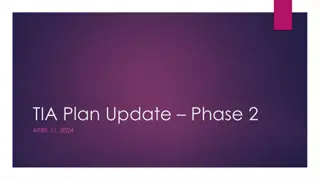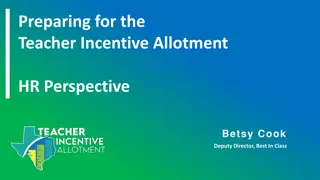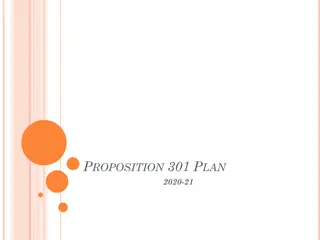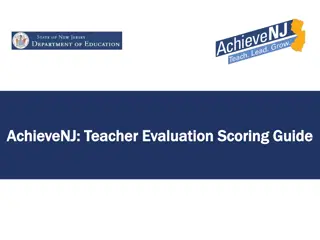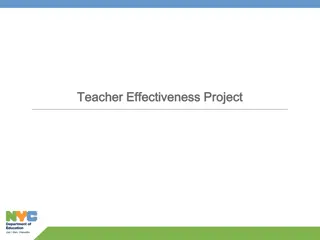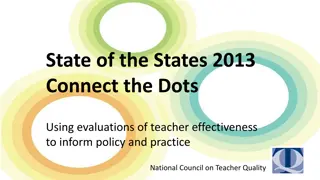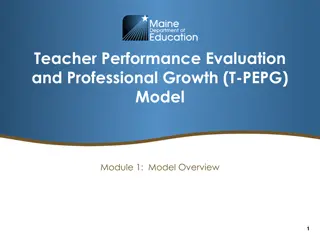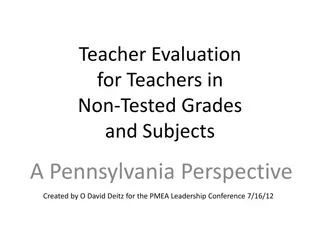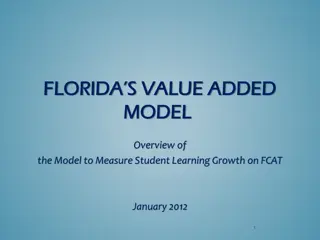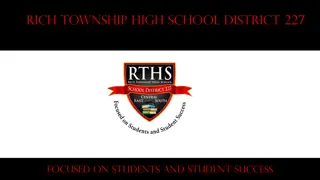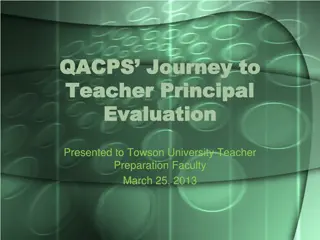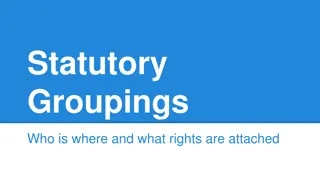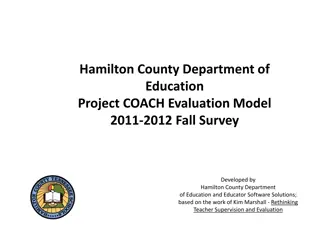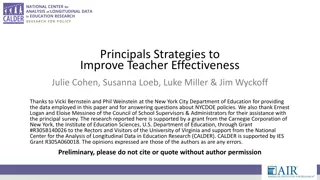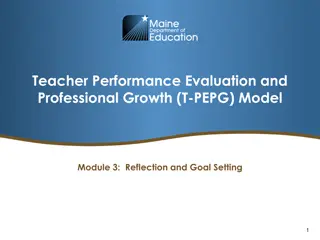SACE Teachers Conference: Enhancing Professional Development in Education
The SACE Teachers Conference focuses on improving teacher education through developing a National Framework for Teacher Education in SA. The Ministerial Committee on Teacher Education aims to create a coordinated system for both initial and continuing professional education. Recommendations include
1 views • 34 slides
Actions Emanating from the Evaluation of the Governance Reform
The evaluation of the governance reform within the WMO aimed to assess its alignment with strategic objectives, effectiveness in responding to societal needs, coordination efficiency, decision-making process, agility, and more. Evaluation criteria included relevance, design validity, effectiveness,
1 views • 13 slides
Teacher Certification and Evaluation Program Phases Overview
The Teacher Certification and Evaluation Program outlines requirements for eligible teachers in GPISD, emphasizing ESL/Bilingual certification and proficiency ratings in T-TESS evaluations. Phase I focuses on ESL/Bilingual certification by January 1, 2024, while Phase 2 extends to November 1, 2024,
0 views • 12 slides
Comprehensive School Quality Assurance and Evaluation Process
A detailed insight into the Quality Assurance Department's role in school evaluation and improvement processes, including Whole School Evaluation (WSE), Follow-through initiatives, Teaching and Learning assessments, Resumption and Examination Monitoring. The process involves both internal self-evalu
0 views • 20 slides
Methods of Training Evaluation: Overview and Importance
Training and development are fast-growing fields globally, including in India. Evaluation plays a crucial role in understanding the effectiveness and efficiency of training programs for human resource development. This presentation covers the concept of training, evaluation strategies, methods/model
0 views • 61 slides
Teacher Incentive Allotment HR Perspective Overview
Explore the strategic approach to aligning the Teacher Incentive Allotment (TIA) with current evaluation systems, emphasizing factors like teacher observation, student performance measures, and additional considerations. Delve into the TIA Readiness Checklist for six key success factors and the impo
0 views • 22 slides
Universal Evaluation Framework: Simplifying Evaluation Processes
This session introduces the Universal Evaluation Framework (UEF) developed for evaluating QAA Scotland Enhancement Themes. Participants learn key evaluation questions, evidence capture, and the Theory of Change to enhance evaluation confidence. The QAA Scotland Evaluation Odyssey details historical
2 views • 14 slides
Proposition 301 Plan Overview for Teacher Compensation
The Proposition 301 Plan for the 2020-21 academic year outlines a structured approach to pay increases for teachers. It includes three components: a 20% increase to base salary, 40% for meeting performance goals, and 40% for duties fulfilled from a set list of menu items. The plan also details speci
0 views • 19 slides
Implementing Blind Evaluation Pilot in HORIZON EUROPE: Key Facts and Process
HORIZON EUROPE is conducting a pilot on Blind Evaluation in the 2023-2024 work program to address biases in the research and innovation evaluation process. The pilot aims to assess the feasibility of blind evaluations in ensuring fairness and mitigating potential biases towards well-known organizati
9 views • 9 slides
Strengthening National Evaluation Capacity in the Era of Sustainable Development Goals
The presentation by Vijayalakshmi Vadivelu at the National Evaluation Capacities Conference 2017 in Istanbul focused on the importance of strengthening national evaluation capacity in alignment with the Sustainable Development Goals (SDGs). The content covers the holistic approach to national evalua
3 views • 18 slides
Exploring Developmental Evaluation for Better Decision-Making
Delve into the realm of developmental evaluation, focusing on its purpose, principles, and application in practice. Understand how developmental evaluation emphasizes real-time data collection for informed decision-making in complex systems. Learn about key principles such as developmental purpose,
0 views • 25 slides
Evaluation Practices in Macedonia: What Works, What Doesn't
The comparison between the effectiveness of evaluation practices and the presence of formal institutions in Macedonia raises questions about the impact of institutional design on outcomes. While some countries with robust evaluation institutions fall short in practice, others lacking such structures
1 views • 7 slides
Enhancing Evaluation Capabilities in Mongolia for Agenda 2030
The Mongolian Evaluation Network in collaboration with UNDP is working to integrate the 2030 Agenda into national strategies and plans, establish institutional coordination mechanisms, align budgets, and enhance data monitoring systems. Key stakeholders including government agencies, NGOs, and inter
0 views • 9 slides
Understanding Demi-Regularity in Realist Evaluation
Realist Evaluation is a theory-driven approach focusing on understanding the context and mechanisms of action behind policies and interventions. This webinar explores the concept of demi-regularity in realist evaluation, its origins, and its application in analyzing complex evidence. Key aspects cov
1 views • 16 slides
AchieveNJ Teacher Evaluation Scoring Guide Overview
This presentation details how districts assess teacher performance in AchieveNJ, outlining the weighting of evaluation elements and explaining the multiple measures used. It covers teacher practice scoring, components weighting, and provides examples for calculating final ratings. Local districts ha
0 views • 24 slides
Enhancing Teacher Effectiveness Project Overview
The Teacher Effectiveness Project aims to create an integrated teacher evaluation and development system to support professional growth and student success in NYC/NY State. Through teacher assessment, development, and strategic decision-making, the project seeks to recognize and retain outstanding t
1 views • 11 slides
Understanding Evaluation in Education
Evaluation in education is a comprehensive term that encompasses measurement, testing, and qualitative examination of student behavior. It involves both quantitative and qualitative descriptions, along with value judgments. Differentiating from mere measurement, evaluation provides a deeper analysis
0 views • 28 slides
Sustainable Evaluation Systems Workshop Summary
Workshop on Sustainable Evaluation Systems by Stephen Porter at the NEC Conference focused on defining evaluation systems, addressing their failures, and emphasizing the importance of quality, use, and networks in achieving sustainability. Participants engaged in activities such as bingo card introd
0 views • 38 slides
Strategic Management: Strategy Review and Evaluation
This chapter delves into the critical process of strategy review, evaluation, and control in strategic management. It covers the nature of strategy evaluation, effective evaluation systems, contingency planning, auditing, using computers for evaluation, and guidelines for effective strategic managem
1 views • 42 slides
Connecting Teacher Effectiveness Evaluations to Policy and Practice in Education
Explore the State of the States 2013 report on using teacher effectiveness evaluations to inform education policy and practice. The report highlights the structure of teacher evaluation systems, state requirements for teacher observations, additional teacher evaluation policies, and important lesson
1 views • 10 slides
Understanding Evaluation and Ideology in Translation
Evaluation plays a crucial role in the study of translation, influencing both meaning and value in communication. This evaluation is reflected through language elements like accentuation, deletion, and substitution. Appraisal, stance, and evaluation are key terms in linguistic analysis that focus on
2 views • 22 slides
Impact and Evaluation Toolkit for Churches and Christian Charities
This toolkit aims to equip churches and Christian charities engaged in small-scale social action projects to think about impact, measure impact, choose data tools, reflect on evaluation data, and use it effectively. It covers principles of evaluation, setting objectives, selecting indicators, storyt
0 views • 34 slides
Evaluation Metrics for IEEE 802.11-14/0107 HEW Proposal
Evaluation metrics play a crucial role in assessing WLAN system performance and achieving the objectives of High Efficiency WLAN (HEW). This proposal by Yonggang Fang et al. from ZTE outlines the key evaluation metrics recommended for evaluating HEW performance, including area throughput, average th
0 views • 12 slides
Overview of Monitoring and Evaluation in the GEF
The Evaluation in the GEF and Training Module focuses on promoting accountability and learning within the Global Environment Facility (GEF) through monitoring and evaluation activities. The GEF Independent Evaluation Office plays a crucial role in assessing results, effectiveness, and performance of
0 views • 25 slides
Teacher Performance Evaluation and Professional Growth (T-PEPG) Model Overview
This training module provides an in-depth look at the Teacher Performance Evaluation and Professional Growth (T-PEPG) model, focusing on key features, structure, and terminology of the MSFE rubric. Participants will explore self-assessment, reflection, goal-setting, student learning objectives, evid
0 views • 40 slides
Teacher Evaluation in Non-Tested Grades: A Pennsylvania Perspective
This document discusses the teacher evaluation system for educators in non-tested grades and subjects in Pennsylvania, emphasizing factors like classroom observation, student performance, and professional responsibilities. It covers the assessment criteria and frameworks used to evaluate teacher eff
2 views • 58 slides
Understanding Florida's Value-Added Model for Teacher Evaluation
Florida's Value-Added Model and the new standards for teacher evaluations aim to measure student learning growth effectively. The model, developed by Florida educators with input from various stakeholders, emphasizes using data from assessments to evaluate teacher performance. The Student Growth Imp
0 views • 28 slides
Chile Country Portfolio Evaluation 2010-2014 Summary
Evaluation process of Chile's country portfolio from 2010-2014 included pre-evaluation, during evaluation, and results/conclusions phases. Challenges like defining scope and participant concerns were addressed. Preliminary conclusions were presented to stakeholders, leading to a trustful and represe
1 views • 6 slides
Potential Amendments for Reforming REACH Evaluation Process
Discussion at the Ad-hoc Meeting of Competent Authorities for REACH and CLP focused on potential options for amending the REACH Regulation to reform the evaluation process. Topics included registration-related measures, substance evaluation, testing proposals, compliance checks, and expectations dur
0 views • 30 slides
Developing an Evaluation Work Plan for Effective Program Assessment
This presentation by Amy D. Andrade from San Jose State University focuses on developing an Evaluation Work Plan to identify responsibilities and timelines. It covers topics such as Evaluation Coaching Support, Webinar Outlines, Logic Model, Inputs-Outputs-Outcomes, Two Approaches to Evaluation, Pro
0 views • 29 slides
Rich Township High School District 227 Human Resources Overview
Rich Township High School District 227's Human Resources department is dedicated to supporting the district's goals through its valuable staff members. The department focuses on employee demographics, teacher education, pupil/teacher ratios, teacher retention, salaries, faculty trends, teacher atten
0 views • 16 slides
QACPS Journey to Teacher Evaluation and School Performance Data
QACPS embarked on a journey towards teacher evaluation reform as mandated by the Education Reform Act of 2010, aiming to implement a comprehensive system by 2013-14. The school also participated in the MSDE pilot in 2011-2012, with notable paradigm shifts towards fair evaluation procedures. School p
0 views • 17 slides
Evaluation Synthesis in Changing Contexts: Enhancing Knowledge for Development Effectiveness
Evaluation synthesis is crucial for promoting learning, reflection, and decision-making in development work. This process involves bringing together diverse knowledge sources to generate strategic insights and facilitate wider use of evaluation findings. The Independent Office of Evaluation of IFAD
0 views • 20 slides
Evaluation of FME Zero Emission Neighbourhoods in Smart Cities
The mid-term evaluation process of FME Zero Emission Neighbourhoods in Smart Cities involves self-evaluation, partner evaluation, and panel evaluation. The procedure includes scientific review, evaluation by scholars, and innovation assessment. Key documents like self-reports, progress reports, and
1 views • 20 slides
Overview of Regular Evaluation 2017 Findings in Estonia
In the Regular Evaluation 2017, efforts were made to maximize the benefits of evaluation outcomes for various stakeholders in Estonia such as the state, society, and institutions. The evaluation focused on a range of actions including preparing legislation, finding experts, creating self-report form
0 views • 6 slides
Understanding Statutory Groupings in Teacher Evaluation Systems
Explore the statutory groupings in teacher evaluation systems, including the relationship between TAP and ISBE ratings, factors determining grouping in Group I to Group IV, and the specific rights attached to each group based on summative ratings. Learn who falls into Group 1 and Group 2 based on pe
0 views • 20 slides
Comprehensive Guide to Training Evaluation Methods
This detailed guide covers the aim of evaluation, evaluation methods, techniques of evaluation, types of evaluation (formative, process, outcome, impact), and the significance of formative and process evaluation in assessing training effectiveness. Learn about the key principles and practices involv
0 views • 45 slides
Evaluation Model for Teacher Supervision and Feedback in Education
Evaluation model conducted by Hamilton County Department of Education in collaboration with Educator Software Solutions, based on Kim Marshall's work on rethinking teacher supervision and evaluation. The evaluation covers aspects like grade levels served, positions held by educators, goal setting co
0 views • 18 slides
Strategies to Improve Teacher Effectiveness in New York City Schools
This research paper explores various strategies implemented in New York City schools to enhance teacher effectiveness. Topics covered include tenure reform, principal strategies, variation in extending teacher probationary periods, and the impact of principal effectiveness on student achievement. In
0 views • 19 slides
Teacher Performance Evaluation and Professional Growth: Reflection and Goal Setting Module Overview
Explore the Teacher Performance Evaluation and Professional Growth (T-PEPG) Model Module 3, focusing on reflection, goal setting, and the development of SMART goals to enhance teaching practices and ensure student success. This module covers self-evaluation, setting professional goals, aligning goal
0 views • 27 slides


